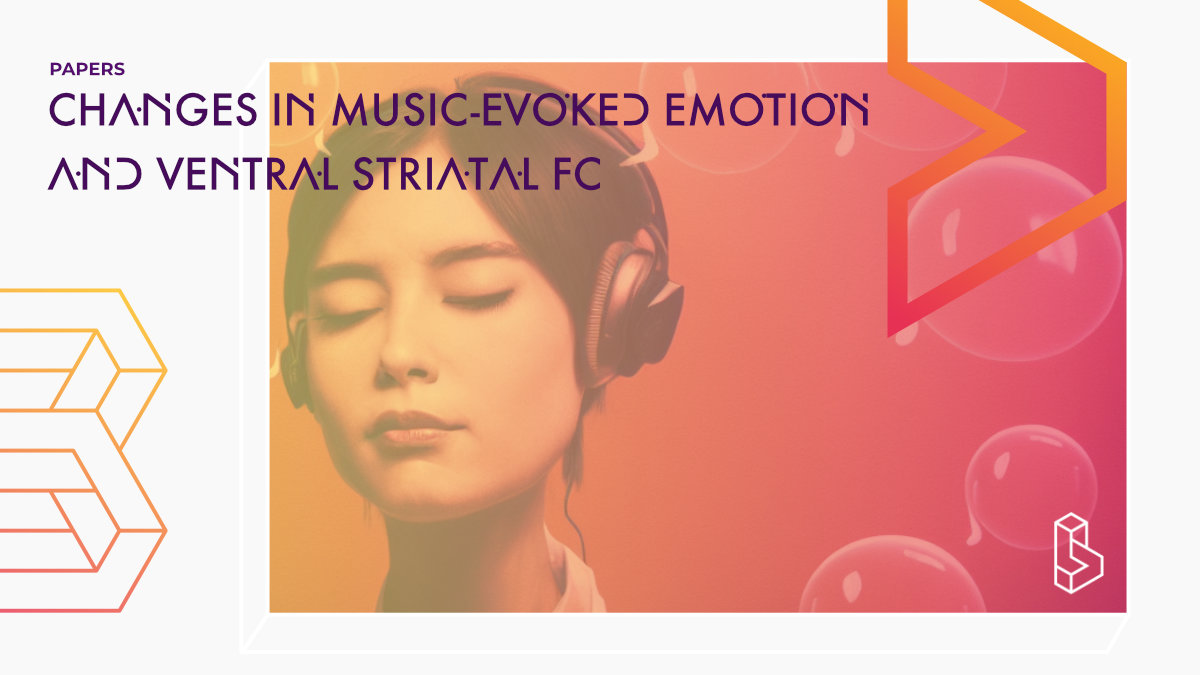This re-analysis (n=15) of a trial with psilocybin (25mg) for depression (TRD) finds that music-evoked emotions are increased after treatment. The finding correlates with decreased anhedonia (inability to feel pleasure). fMRI measures also show a decrease in connectivity (FC) between the nucleus accumbens (NAc, music-related area) and the default mode network (DMN).
Abstract
“Background: Music listening is a staple and valued component of psychedelic therapy, and previous work has shown that psychedelics can acutely enhance music-evoked emotion.
Aims: The present study sought to examine subjective responses to music before and after psilocybin therapy for treatment-resistant depression, while functional magnetic resonance imaging (fMRI) data was acquired.
Methods: Nineteen patients with treatment-resistant depression received a low oral dose (10 mg) of psilocybin, and a high dose (25 mg) 1 week later. fMRI was performed 1 week prior to the first dosing session and 1 day after the second. Two scans were conducted on each day: one with music and one without. Visual analogue scale ratings of music-evoked ‘pleasure’ plus ratings of other evoked emotions (21-item Geneva Emotional Music Scale) were completed after each scan. Given its role in musical reward, the nucleus accumbens (NAc) was chosen as region of interest for functional connectivity (FC) analyses. Effects of drug (vs placebo) and music (vs no music) on subjective and FC outcomes were assessed. Anhedonia symptoms were assessed pre- and post-treatment (Snaith–Hamilton Pleasure Scale).
Results: Results revealed a significant increase in music-evoked emotion following treatment with psilocybin that correlated with post-treatment reductions in anhedonia. A post-treatment reduction in NAc FC with areas resembling the default mode network was observed during music listening (vs no music).
Conclusion: These results are consistent with current thinking on the role of psychedelics in enhancing music-evoked pleasure and provide some new insight into correlative brain mechanisms.”
Authors: Melissa Shukuroglou, Leor Roseman, Matt Wall, David J. Nutt, Mendel Kaelen & Robin L. Carhart-Harris
Summary of Changes in music-evoked emotion and ventral striatal FC after psilocybin-AT for depression
Modern neuroimaging studies indicate that the ventral striatum (VS) is activated by music listening and is involved in the processing of reward and emotion. The VS has tight structural and functional connections with the amygdala, orbitofrontal cortex and insula.
Listening to music has been shown to engage areas of the brain associated with reward, emotion and memory processing. Anhedonia, a condition where one cannot experience pleasure in daily activities, is associated with reduced music-evoked pleasure.
Study details
Compounds studied
Psilocybin
Topics studied
Music
Neuroscience
Study characteristics
Open-Label
Re-analysis
Participants
15
Humans
Authors
Authors associated with this publication with profiles on Blossom
Robin Carhart-HarrisDr. Robin Carhart-Harris is the Founding Director of the Neuroscape Psychedelics Division at UCSF. Previously he led the Psychedelic group at Imperial College London.
David Nutt
David John Nutt is a great advocate for looking at drugs and their harm objectively and scientifically. This got him dismissed as ACMD (Advisory Council on the Misuse of Drugs) chairman.
Leor Roseman
Leor Roseman is a researcher at the Centre for Psychedelic Research, Imperial College London. His work focussed on psilocybin for depression, but is now related to peace-building through psychedelics.
Mendel Kaelen
Mendel Kaelen is a neuroscientist and entrepreneur, researching and developing a new category of psychotherapeutic tools for care-seekers and care-providers. Mendel has researched the incomparable effects of music on the brain during LSD-assisted psychotherapy. His work has determined how LSD increases enhanced eyes-closed visual imagery, including imagery of an autobiographical nature. This gives light to how music can be used as another dimension in helping psychotherapists create the ideal setting for their patients.
Institutes
Institutes associated with this publication
Imperial College LondonThe Centre for Psychedelic Research studies the action (in the brain) and clinical use of psychedelics, with a focus on depression.
Compound Details
The psychedelics given at which dose and how many times
Psilocybin 10 - 25mg | 1x
Linked Research Papers
Notable research papers that build on or are influenced by this paper
Psilocybin with psychological support for treatment-resistant depression: an open-label feasibility studyThis is the first modern study (n=12) on psilocybin and its effects on treatment-resistant depression (TRD). It shows that two sessions with psilocybin (10mg and 25mg) in combination with psychological support can reduce depressive symptoms over periods of one week to three months after treatment. Psilocybin was well tolerated by all of the patients, and no serious or unexpected adverse events occurred.
Linked Clinical Trial
Assessing the subjective intensity of oral psilocybin in patients with treatment-resistant depression: A Pilot Study (PSILODEP-PILOT)This open-label trial (n=12), also known as PSILODEP-PILOT is the first to test psilocybin in patients in the UK. The study found psilocybin (10-25mg, x2) to be well-tolerated.

